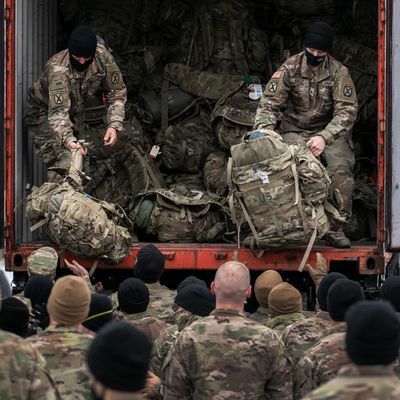
The longest war in American history will be over by mid-September.
Or so the Biden administration has now promised.
On Tuesday, the White House leaked word of President Biden’s plan to withdraw all U.S. troops from Afghanistan by the 20th anniversary of the 9/11 attacks. On one level, this decision constitutes a prolongation of U.S. involvement in the conflict. Last year, the Trump administration signed an agreement with the Taliban, which committed the U.S. to withdraw its forces by May 1, 2021. In exchange, the Taliban vowed to cut off all ties with Al Qaeda and enter negotiations with the internationally recognized government in Kabul.
But after those negotiations failed to bear fruit — and the Taliban expanded its territorial control — opinion among America’s military and diplomatic elite (once again) turned against a timely withdrawal. In the present context, few had expected Biden to honor the May 1 deadline. The primary significance of his new policy is, therefore, not that it will extend America’s war in Afghanistan past May 1 but rather that it will end it within the year.
Of course, as the history just recited demonstrates, the U.S. has blown past such deadlines before. The Biden position’s credibility derives specifically from the administration’s insistence that it is entirely unconditional; no change in the balance of power between the Taliban and Kabul will postpone the withdrawal plan.
“If we break the May 1st deadline negotiated by the previous administration with no clear plan to exit, we will be back at war with the Taliban, and that was not something President Biden believed was in the national interest,” a senior administration official told the Washington Post. “This is not conditions-based. The president has judged that a conditions-based approach … is a recipe for staying in Afghanistan forever. He has reached the conclusion that the United States will complete its drawdown and will remove its forces from Afghanistan before September 11th.”
The United States has expended trillions of dollars and 2,372 American lives on its occupation of Afghanistan. The war we triggered in that country has killed at least 100,000 Afghan civilians. America’s toppling of the Taliban did facilitate genuine advances for Afghan women, whose rates of school enrollment, life expectancy, and civil-service employment have all increased by large margins since the U.S. invasion, according to data from the World Bank and the World Health Organization. Proponents of a prolonged occupation argue that the withdrawal of U.S. troops will jeopardize these gains by clearing the way for a civil war that the Taliban is better equipped to win. But even with U.S. troops stationed in the country, the Taliban has been gaining ground. Disempowering the Islamist movement would require sacrifices that the U.S. public shows no inclination to make. And for good reason.
No significant American national security or geopolitical interests are at stake in Afghanistan. As the past year has painfully illustrated, there are greater threats to American well-being than those seared into our national psyche on 9/11. Pandemic prevention, climate-change mitigation, and nuclear deproliferation will do far more to reduce catastrophic threats to U.S. public safety than preventing governments sympathetic to extremists from taking power in the Middle East.
Despite Donald Trump’s support for a more abrupt exit from Afghanistan, many congressional Republicans panned Biden’s decision on Tuesday, with Mitch McConnell calling it “a retreat in the face of an enemy that has not yet been vanquished and abdication of American leadership.” Former secretary of State Colin Powell, who oversaw the commencement of the U.S. occupation, called the withdrawal overdue, telling the Post, “I’d say we’ve done all we can do … What are those troops being told they’re there for? It’s time to bring it to an end.”
The Taliban had promised to renew attacks on U.S. soldiers in their country once the May 1 deadline had passed. Biden’s apparent hope is that an unequivocal commitment to steady withdrawal over the coming months will preempt such belligerence. As of this writing, the Taliban has yet to issue an official response to the White House announcement.






























